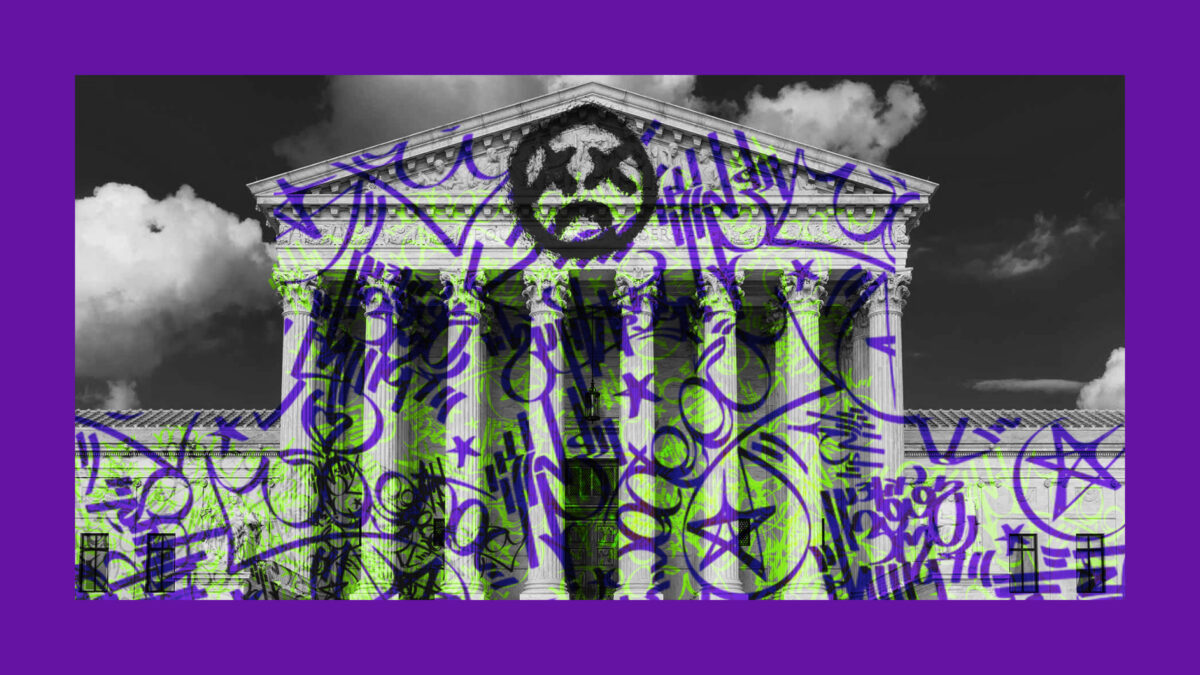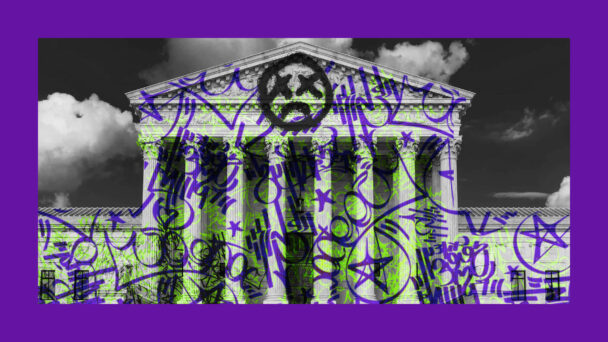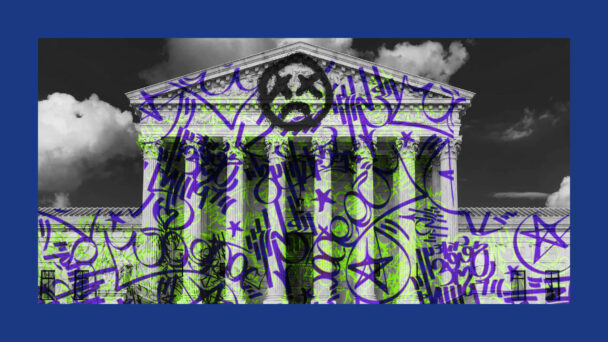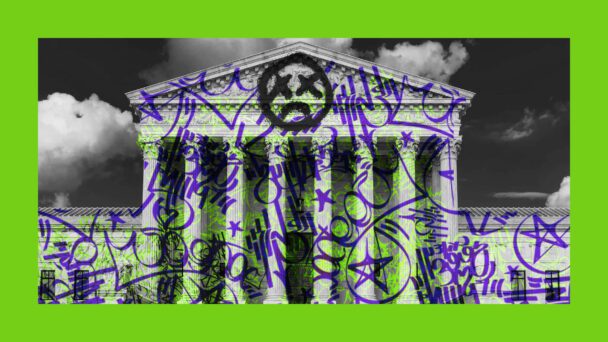I’m so sick of the lie of the “apolitical” and “objective” Supreme Court I could barf. There are myriad examples in Supreme Court case law that expose this lie for what it is (I’m on a whole podcast about those examples), but one that sticks out to me is Hoffman Plastic Compounds, Inc. vs. NLRB, a 2002 decision in which the Supreme Court decided by a 5-4 majority that their own preferred immigration policy trumped labor law. In a ruling even more conservative than the Bush administration’s policy at issue, the case held that an employer who illegally fires an undocumented immigrant for union organizing is immune from having to pay the worker back pay. Rather than the fantasy story we’re told about the impartial Supreme Court, here’s a trend that’s actually real: the highest court in the land will take almost every opportunity given to slash the legal protections for the most disadvantaged among us.
Jose Castro was hired by Hoffman Plastic Compounds, Inc., in May 1988. Hoffman Plastic manufactured vinyl compound materials and other plastics at a factory in Panorama, California, and hired Castro to operate blending machines to mix and process chemical formulas. When he was hired, Castro did not have legal authorization to work in the United States, though he presented false documents to Hoffman Plastic that appeared to verify his status and show he was eligible to work legally. At the time, the Immigration Reform and Control Act of 1986 (IRCA) penalized both companies that knowingly employed undocumented workers, and workers employed without legal authorization. But while IRCA was passed to dissuade both employers and employees from engaging with the unauthorized immigrant labor market, existing labor laws protecting the rights of workers still applied regardless of a worker’s immigration status.
Seven months later, in December, a union-organizing campaign started at the Hoffman plant, led by the United Rubber, Cork, Linoleum, and Plastic Workers of America. Castro and his colleagues organized with the union and distributed information about unionizing to other workers. In January, Hoffman fired Castro and three other union supporters.
This is, of course, illegal under federal labor law, which says a company cannot interfere with workers’ right to organize into unions, or punish workers for doing so. Three years later, in 1992, the National Labor Relations Board (NLRB) found that the layoffs of Castro and his colleagues were intended to “rid [Hoffman] of known union supporters” and therefore violated the law. As a result of the illegal terminations, the NLRB ordered Hoffman to offer the four workers reinstatement of their jobs and back pay.
Though the company initially agreed to comply with the order, Hoffman’s tune changed as administrative proceedings continued. During a hearing to determine the amount of back pay owed to Castro, Hoffman learned that Castro was undocumented and had provided false documents to show work authorization when he was hired. Hoffman Plastic argued that even though they fired Castro in violation of labor laws, they did not have to pay Castro back pay because he had gotten the job under a false pretense.
The NLRB disagreed, and ordered that Hoffman pay Castro more than $66,000, which he would have earned had he not been illegally fired from the company for union organizing. The Board concluded that their decision would dissuade Hoffman and other companies from hiring of unauthorized migrant workers, thereby fulfilling the purpose of IRCA. Even Republican President George W. Bush’s administration agreed with the NLRB, noting in briefs in the subsequent Supreme Court case that protecting the labor rights of undocumented workers was an important enforcement mechanism in disincentivizing companies from hiring workers they could otherwise easily exploit outside of the requirements of labor law.
When a conservative presidential administration wasn’t conservative enough for them, Hoffman Plastic knew what to do: they appealed the NLRB’s decision to the Supreme Court.
In the end, Jose Castro would be awarded nothing, and the administration’s hope that the two statutory schemes could be harmonized was quashed. In a 5-4 decision written by Chief Justice William Rehnquist, the Court ruled that IRCA–a law that says nothing about labor protections or the NLRB’s enforcement of those protections–foreclosed the NLRB from awarding back pay to an undocumented worker. In other words, immigration policy trumps labor law–because the Supreme Court says so. The majority concluded that “allowing the Board to award back pay to illegal aliens would unduly trench upon explicit statutory prohibitions critical to federal immigration policy, as expressed in IRCA.”
Billy, I’m not following. How would awarding back pay to a worker who was illegally terminated interfere with a prohibition on hiring undocumented workers in the first place? Unfortunately this is William Rehnquist writing, so my desire for a logical explanation will remain unmet. (There is another reason why he won’t answer me—he’s dead.)
Ultimately, this is Billy and the rest of the majority grasping at straws: if the NLRB was permitted to order companies to pay back pay to undocumented workers they illegally fired, it would “encourage the successful evasion of apprehension by immigration authorities, condone prior violations of the immigration laws, and encourage future violations.”
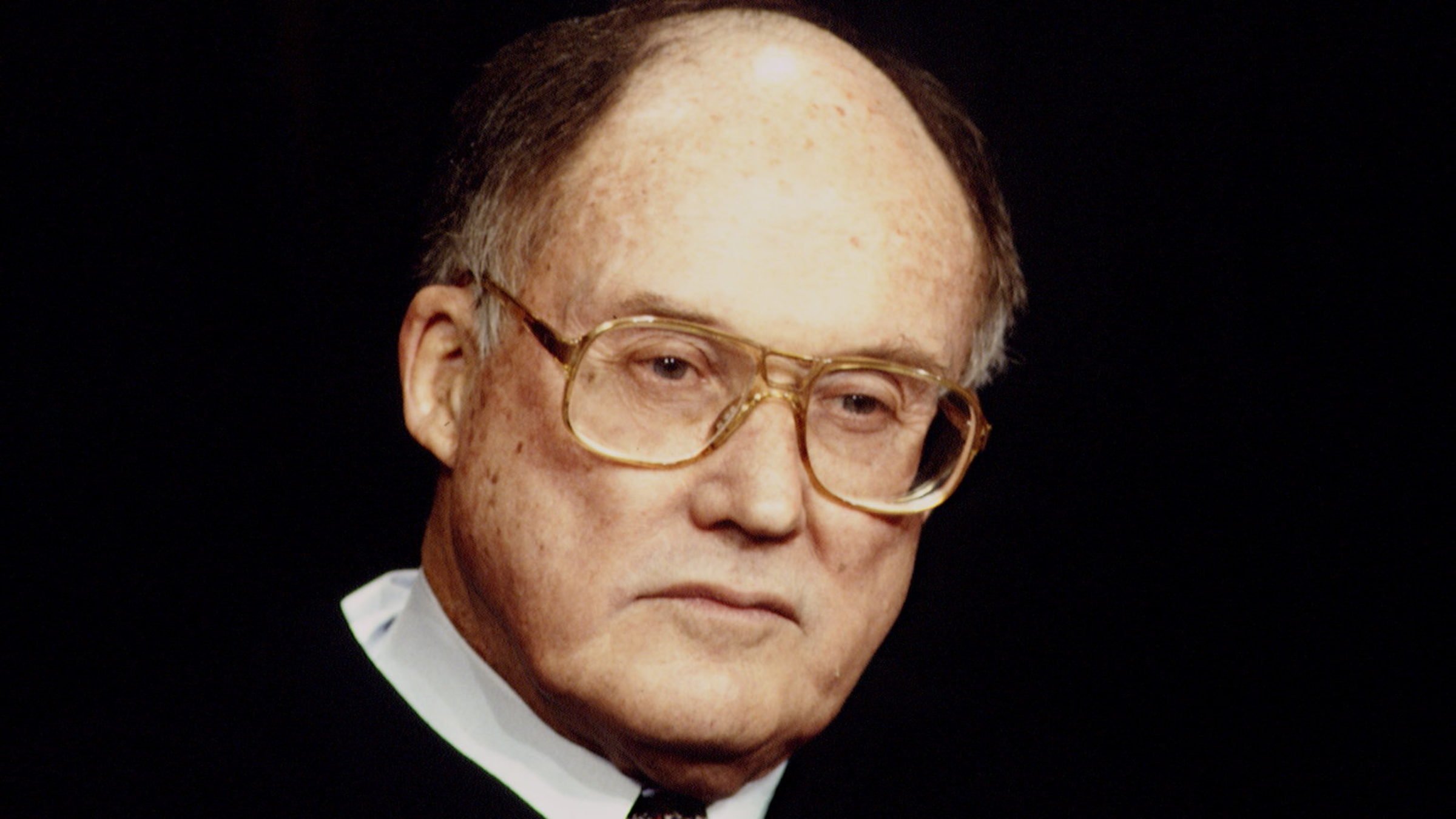
William Rehnquist wrote, so my desire for a logical explanation will remain unmet. (Photo by Jeffrey Markowitz/Sygma via Getty Images)
The opinion asserts that awarding back pay would encourage illegal immigration–as if migrants would come to America hoping to get fired illegally for union organizing so they could fight for more than a decade to get back pay. Rehnquist and the majority essentially say that Jose Castro would be getting away with a crime, and encouraged to keep working illegally, if he were awarded back pay. But this analysis is upside-down: they’re solely concerned with the individual worker’s illegal action rather than the company that fired him illegally and now benefits from doing so, and they kneecap labor law protections while actually subverting the purposes of IRCA. As Justice Breyer noted in dissent, back pay is consistent with immigration policy and “helps to deter unlawful activity that both labor laws and immigration laws seek to prevent.”
The “problem” the Court says it’s solving already had a solution. IRCA provided for penalties to workers who tender false documents to get hired. Hoffman Plastic would not have been penalized under the immigration law, because they did not know that Castro was not legally authorized to work. Labor law is a wholly different area, where penalties to employers for their infringement on workers’ rights are enforced. Hoffman fired Castro illegally, which invoked labor law. And it’s probably worth noting again that George W. Bush’s Department of Justice told the Supreme Court that Jose Castro’s back pay award would not interfere with the implementation of the administration’s immigration policy. But once Hoffman learned that Castro was undocumented, the Supreme Court rewarded them and other employers by creating an exception for when labor law protections apply–companies don’t have to pay for violating workers’ rights, if those workers are undocumented. In a case that represents a pinnacle example of legislating from the bench, the Supreme Court simultaneously created penalties in immigration law that didn’t exist (you won’t be protected by labor law, Mr. Worker), and wrote exceptions into labor law that didn’t exist (you won’t have to pay for violating workers’ rights, Mr. Company).
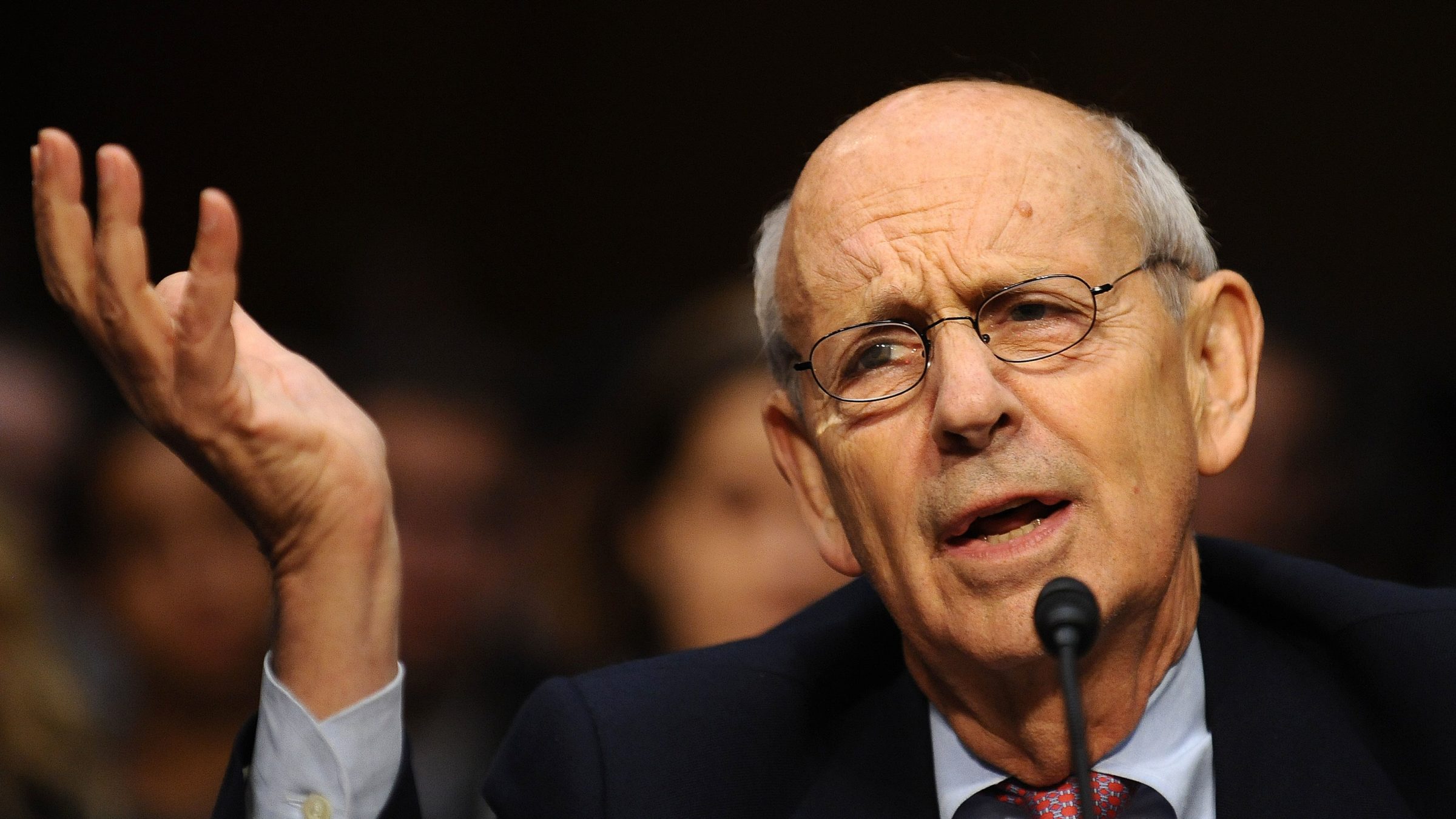
Breyer noted in dissent that back pay is consistent with immigration policy and “helps to deter unlawful activity that both labor laws and immigration laws seek to prevent.” (Photo by JEWEL SAMAD/AFP via Getty Images)
The decision is illogical, and it’s inhumane. Jose Castro is repeatedly referred to as a criminal in the opinion, while no mention is made that Hoffman Plastic broke the law by firing him. Castro and migrant workers are constantly labelled “aliens,” “alien-employees,” and “illegal aliens,” terms so confoundingly racist they make my stomach turn. Making no attempt to hide his vitriol, Rehnquist accuses the federal agency tasked with protecting worker rights in this country of wanting to “award back pay to an illegal alien for years of work not performed, for wages that could not lawfully have been earned, and for a job obtained in the first instance by a criminal fraud.” Of course, an award of back pay is often definitionally “compensation for work not performed,” because there is an unjust reason—like an illegal termination—why the work was not performed. Not to mention that this is a disgusting misstatement of labor law: there may be legal penalties for getting work with false authorization and hiring unauthorized workers, but a company cannot withhold wages from the workers they hire on the lie that wages were not “lawfully earned.” Legal accountability for harm caused does not dissipate when the victim is undocumented—you cannot assault an undocumented person and get away with it, you cannot steal an undocumented person’s wallet and get away with it, you cannot violate an undocumented person’s civil rights and get away with it, on the excuse that their existence is unlawful. While stripping Castro of any remedy for the illegal treatment he received from Hoffman on account of where he was born, Rehnquist insists that Hoffman is not “get[ing] off scot-free,” since the company still had to adhere to “significant sanctions.” But don’t hold your breath for just accountability here—in the absence of the order to pay back pay, the “significant sanction” Hoffman had to comply with was posting a notice informing workers of their rights at the plant. We’re talking taping up a literal poster on the wall. The dehumanization of undocumented workers—by whom entire U.S. industries like restaurants, materials manufacturing, and agriculture foundationally subsist—screams off the pages.
Beyond the creation of an incentive for employers to hire undocumented labor, the Supreme Court’s decision in Hoffman Plastic represents an intersection of anti-immigrant and anti-labor sentiment, the right-wing effort to atomize workers and stifle the labor movement by telling corporations that they can union bust and retaliate against workers for collective action, as long as they target the right workers. Everyone involved in the case agrees that Hoffman Plastic fired Jose Castro illegally. Instead of holding the company accountable for that illegal activity, the Court demonstrated how it creates legal inequities among workers and divides what would otherwise be a united labor collective into different classes. In denying the remedial power of the NLRB, lowering the cost to an employer for violating labor law, and increasing the employer’s incentive for hiring undocumented employees, the Court undeniably deepened these divisions and stoked these resentments.
Why did the Court go beyond what a Republican presidential administration wanted, why create an incentive for companies to hire the very workers the law purports to discourage from entering the country, why make the most legally vulnerable workers even more exploitable? Taking a step back from the specific facts in the case, it’s important to remember that Supreme Court justices are human beings. Deeply flawed, biased, prejudiced, human beings who act within their historical and political context, not outside of it. Case in point: I don’t think there can be any complete treatment of a William Rehnquist opinion having to do with undocumented workers or racial minorities without mentioning that William Rehnquist is a documented segregationist. In 1952, as law clerk for Supreme Court Justice Robert Jackson, Rehnquist wrote a memo arguing against school desegregation as the Court considered Brown v Board of Education. At the end of the memo, Rehnquist expressed his view that Plessy v. Ferguson, the infamous 1896 ruling that upheld racial segregation under the “separate but equal” principle, had been correctly decided and should be reaffirmed. After his time as a Supreme Court clerk, Rehnquist was repeatedly alleged to have participated in and led voter suppression efforts in Arizona in the late 1950s, in which he personally intimidated and accosted voters of color at the polls, aggressively demanding that they prove they could speak English, that they were literate, and that they were United States citizens. I wonder what William Rehnquist thought about when Jose Castro’s case was in front of him.
“Objective” interpretation of the law is not possible, because these personal views, even (or maybe in particular) the most hateful ones, undeniably make their way into judges’ rulings by coloring the way they see the parties involved in a case, who the law should protect, and the issues at stake in their decisions.
In addition to individual prejudices, there are the political and cultural sentiments of their time. This case was argued at the Court four months after 9/11, after which a virulent anti-immigrant attitude swept the country. While we’re told that a supposedly “non-political” judicial branch can operate independently of these swings in public opinion, a case like Hoffman Plastic shows that partisan judges maneuver through these contemporary ideologies themselves, perhaps emboldened in this instance in anti-immigrant and anti-labor beliefs by the political timing.
But beyond the individual justices’ beliefs and the sociopolitical context, there’s no greater empowerment of an ideological Supreme Court than the structure of judicial supremacy, which places the Supreme Court as the final arbiter on the actions of the other two branches of government. In Hoffman Plastic, the legislature and the executive branch said they wanted immigration law and labor law to work together. Five justices saw an undocumented worker being awarded back pay and decided to undermine both.
